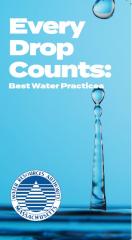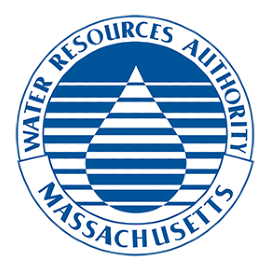MWRA’s Water Conservation and Efficiency programs help maintain regional water demand comfortably below the water supply system’s safe yield (300 million gallons per day).
MWRA’s current 5-year average regional water demand is approximately 200 mgd. Water conservation also helps maintain regional wastewater flow below the required permit limit at the Deer Island Wastewater Treatment Plant (dry day limit of 436 million gallons per day). MWRA's current 5-year average regional wastewater flow is approximately 315 mgd. Tips and information on how to save water at home are linked below.
More information is available for communities, environmental groups, and individual customers covering a wide range of water conservation and efficiency topics. Details and links are provided below.
MWRA Water Conservation
Annually, MWRA prepares a demand management report (PDF) (including water conservation) to meet the requirements of its National Pollution Discharge Elimination System (NPDES) Permit regarding wastewater flow to the Deer Island Treatment Plant.

To assist member communities, environmental groups, and other interested stakeholders with their water conservation activities; the MWRA provides water conservation educational brochures (bill stuffer sized, 3.5" x 6.5") for local distribution. If you are a water superintendent or official in the MWRA service area and would like to receive bulk quantities of the brochures at no cost, please complete the online request form.
To leave a message on MWRA's Water Conservation Hotline, please call (617) 242-7283 / (617) 242-SAVE.
The MWRA provides water-efficient retrofit kits (low-flow shower heads, low-flow faucet aerators, leak detection dye tablets, and installation guide) at no cost to member communities, individual customers, housing authorities, property managers, etc. within the service area (see list of service area communities on the request form). The MWRA purchases these easy-to-install kits in bulk.

To receive low-flow water fixtures, please complete the online request form.

Communities or large users may request a reasonable quantity of water conservation kits. The kits include:
- A Low Flow Showerhead – 2.0 gpm – plastic and chrome components
- Faucet Aerators – 1.5 gpm for the kitchen or bathroom
- Dye Tablets – to check for silent toilet leaks
- Installation Instructions
To leave a message on MWRA's Water Conservation Hotline, please call (617) 242-7283 / (617) 242-SAVE.
To ensure that member communities identify and repair leaks in local-owned distribution systems, MWRA developed leak detection regulations that went into effect in July 1991. Under these regulations, communities purchasing water from MWRA are required to complete a leak detection survey of their entire distribution system at least once every two years and repair water leaks that are detected.

Communities can accomplish the survey using their own contractor or municipal crews; or alternatively, using MWRA’s task-order leak detection contract. MWRA’s task-order contract provides high quality leak detection services at a reasonable cost that has been bid taking advantage of the large volume of work anticipated throughout the regional system.
Leak detection services performed under the task-order contract are paid by MWRA, and the costs are billed to the community the following year.
To request information or initiate a leak detection task-order project, please contact Gloria Kazeera, Project Manager, by email or call (617)-570-5425.
For the 3-year period of May 2024 through April 2027, MWRA has one task-order leak detection contract.

MWRA's Industrial, Commercial and Institutional (ICI) Water Management program was developed to help businesses, industries, and institutions improve their water efficiency. During the early 1990s, MWRA conducted numerous ICI water use surveys that produced specific water efficiency plans. Information developed from these surveys was used to develop the sector specific reports and case studies (see links below) that provide practical, cost-effective, techniques to conserve water. Although MWRA no longer conducts water use surveys for individual businesses, this service is widely available through water/energy audit consultants.
"Approximately 15% of the total water use in commercial and institutional facilities in the U.S. takes place in hospitality and food service establishments"
- USEPA, WaterSense
Reports
Water Efficiency for Athletic Facilities, Schools and Colleges
Water Efficiency for Commercial Buildings
Water Efficiency for Hospitals
Water Efficiency for Restaurants
Case Studies
Norwood Hospital, Norwood, Massachusetts
MicroSemi USPD Inc., Watertown Massachusetts
The Massachusetts Water Resources Authority has teamed with the U.S. Environmental Protection Agency’s (EPA) WaterSense program to help consumers save water for future generations and reduce costs on their utility bills.
WaterSense aims to decrease indoor and outdoor water use through water-efficient products and simple water-saving practices. The program encourages customers to look for WaterSense labeled products, which have been independently certified for efficiency and performance, and promotes water-saving techniques that reduce stress on water systems and the environment.
“The goal of EPA’s WaterSense program is to help Americans save water and money by offering simple ways to reduce water use though water-efficient product choices,” says Sheila Frace, Director of the EPA Office of Water’s Municipal Support Division. “Using water more efficiently can help delay the need to create more supplies, saving communities money and resources, as well as ensuring that water will be available for future generations.”
WaterSense, a partnership program sponsored by the U.S. Environmental Protection Agency, seeks to protect the future of our nation's water supply by offering people a simple way to use less water. For more information on WaterSense, and for a full list of labeled products and WaterSense irrigation partners, visit their website.
Water Conservation Programs & Toolkits
- Energy Star
- EPA's WaterSense Program
- Massachusetts Water Conservation Toolkit
- Metropolitan Area Planning Council Watersmart Toolkit
Water Conservation Information
- Alliance for Water Efficiency
- Boston Water and Sewer Commission (BWSC)
- Massachusetts Department of Environmental Protection Water, Wastewater and Wetlands
- Massachusetts Drought Information and Assistance
- Massachusetts Horticultural Society
- Water – Use It Wisely
Water Conservation Efforts in Other States
- Albuquerque, New Mexico Water Conservation - xeriscaping
- Denver, Colorado Water Conservation
- Minnesota Department of Natural Resources Conservation Page
- Northwest Florida Water Management District Water Conservation
- Portland, Oregon Water Conservation
- San Diego, California Water Conservation
- Southwest Florida Water Management District Conservation
- Tampa, Florida Conservation and Education
- Tucson, Arizona Water Conservation
- Washington Suburban Sanitary Commission - Water Usage Chart
